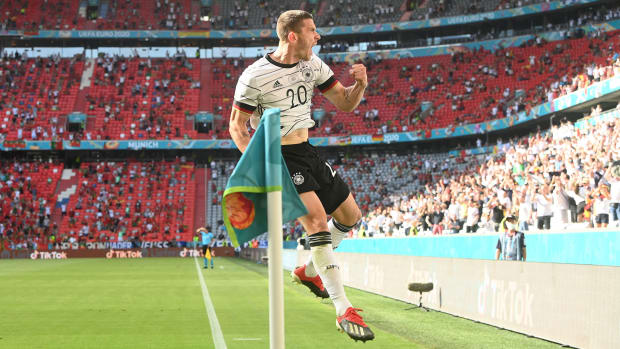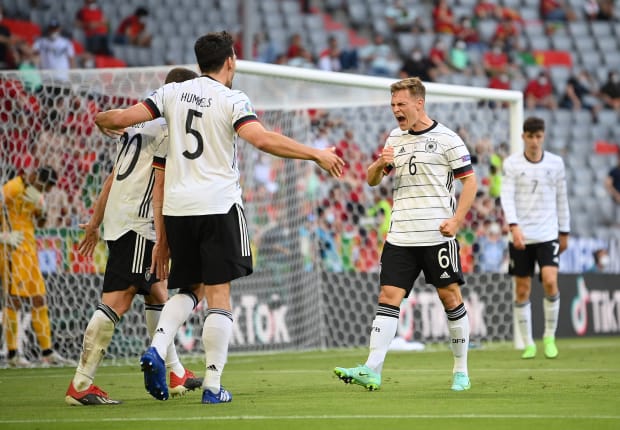Germany roared back after a Euro-opening defeat to France, with reports of its demise overstated—at least when it comes to its wing play.
It was extraordinary and it was exhausting and, by the end, Germany’s Euros had been resurrected while Portugal’s defense of its title looked far less assured than it had after it won its opener 3–0 against Hungary on Tuesday. Assessing what a frantic game, won 4–2 by the Germans on Saturday in Munich, actually says about the quality of the two sides is rather more complex.
In a sense, it’s no great revelation that Germany is very good going forward and rather less competent at the back but, still, the way the two wingbacks, Joshua Kimmich and Robin Gosens, tore Portugal to shreds was striking. Rather more of a surprise was Portugal’s vulnerability to those thrusts from wide areas and its inability to cope with Germany’s rapid switches of play: this, after all, is a side renowned for its miserliness. The consequence, after France was held to a 1–1 draw in Hungary, is a fascinatingly poised group of death. Germany will qualify for the last 16 if it beats Hungary in Munich, while Portugal, the defending champions, would be at severe risk of going out were it to lose to France in a rematch of that 2016 final.

For all the brilliant players in the Germany squad, the sense has been of a team that simultaneously lacks an orthodox center forward and a defense. Increasingly, it has seemed to lack a manager. The legacy of Jögi Low is contested. He may have been central to the developments in German football 10-15 years ago, first as assistant to Jürgen Klinsmann and then as coach in his own right, but despite the World Cup win in 2014, there is a sense that in the past decade he has struggled with the way the game has developed.
At the 2010 World Cup, Germany was a counterattacking team and was very good at it, putting four past England and Argentina before having the misfortune to run into the all-conquering Spain in the semifinals. Thereafter, he has tried to instill a more progressive style, with diminishing results. Even in Brazil in 2014, Germany was extremely uncertain, struggling against Ghana and Algeria before a reversion to that counter-attacking approach before the quarterfinal. That game, against France, and the final, against Argentina, were won 1–0, but the general perception was warped by the 7–1 win over Brazil in the semifinals. That too, though, was a victory based on the counterattack, as a hysterical Brazil self-destructed.
What has followed has been a series of frustrating defeats at key stages, almost invariably caused by an attack over-committed. Everything then became more complicated with success in the FIFA Confederations Cup in 2017 when a young squad looked set to sweep all before it. But Löw struggled to integrate those players with more established stars, and the result was the shambles of the 2018 World Cup, when Germany went out in the group stage for the first time.
Many felt Löw should have gone then, and there has been very little since that has convinced otherwise—a 6–0 UEFA Nations League defeat in Spain, a 2–1 World Cup qualifying defeat at home to North Macedonia, frequent changes of approach, and then a humbling about-face as he was forced to recall Thomas Müller and Mats Hummels after having very publicly dropped them after the World Cup. Defeat to France in the teams' competition opener, which could easily have been by more than 1–0, put Germany under real pressure.
Löw retained the same personal and the same shape against Portugal Saturday, and the result was a performance even more chaotic. Going forward, Germany was thrilling, but defensively it remained shambolic, and when Cristiano Ronaldo gave Portugal the lead from a breakaway following a Germany corner kick, German fans must have been fearing the worst. The counter was ruthlessly worked, with Ronaldo heading the ball clear then sprinting the length of the field to turn in Diogo Jota’s cross, but it was hard not to wonder how on earth Kai Havertz had ended up the last man back for Germany, and quite why İlkay Gündoğan had drifted to the right as the corner was taken.

But Germany’s pressure continued, and Rúben Dias fired into his own net from a Gosens cross after 34 minutes, with Havertz also vying for the redirect. Five minutes later, Raphaël Guerreiro added a second own goal, as Kimmich, the right wingback, returned a cross from the left across the box. Another Gosens cross created a third German goal and a first for Havertz six minutes into the second half.
Suddenly, Portugal was exposed: it is a very fine counterattacking side, but when it has to chase the game, its limitations are left bare. After 61 minutes, Germany had a fourth, with Kimmich crossing for Gosens to head in at the back post. A poorly defended free kick allowed Jota to pull one back for Portugal, Renato Sanches hit the post with a powerful blast and there were other Portuguese chances down the stretch, but Germany, this time, held out.
Germany has played itself back into contention and made somewhat of a statement of intent. Its attack is potentially tournament-winning, but its defense, at the moment, is certainly not.
More Euro 2020 Coverage: